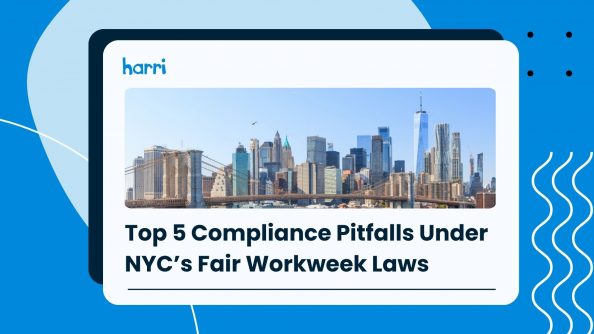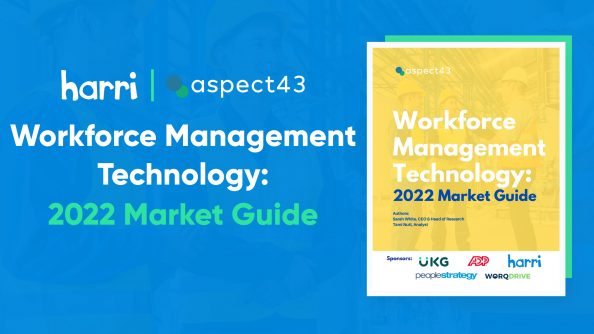Essential Updates on Labor Regulations: Compliance Advisory Q2 2025

- By Harri Insider Team | June 13, 2025
Disclaimer: Please note this advisory is intended for summary purposes only. Any guidance or materials provided do not constitute legal advice and cannot be substituted for the advice of legal counsel.
This advisory highlights significant updates affecting employers nationwide. Several new laws will take effect in July 2025, requiring immediate attention to ensure your policies, job postings, and workplace practices remain compliant. We have analyzed these changes to help you understand your new obligations and ensure your business remains compliant.
State and Local Compliance Updates
California: Court Confirms Enforceability of Prospective Meal Period Waivers
In a significant ruling on April 21, 2025, the California Court of Appeal affirmed in La Kimba Bradsbery v. Vicar Operating, Inc. that employers can obtain prospective written waivers for first meal periods on shifts lasting more than five but no more than six hours.
- Key Holding: Under California Labor Code section 512, an employee can voluntarily waive their right to a 30-minute meal period in advance, provided the agreement is made by mutual consent and the total workday does not exceed six hours.
- Compliance Requirements: For a prospective waiver to be enforceable, it must be part of a written agreement that is mutually consented to by both the employer and employee. Crucially, the agreement must also state that it is revocable by the employee at any time. The court noted it would hesitate to uphold waivers obtained through coercion or signed unknowingly by employees.
Cleveland, OH: Salary History Ban and Pay Scale Disclosure Mandate
Effective April 30, 2025, Cleveland’s Ordinance No. 104-2025 creates new pay transparency obligations for employers with fifteen or more employees.
- Salary History Inquiry Ban: It is now an unlawful practice to inquire about a job applicant’s salary history. Employers are prohibited from screening candidates based on their salary history. Furthermore, they cannot rely solely on a candidate’s past compensation when making a hiring or salary decision.
- Pay Scale Disclosure: Employers must provide the salary range or scale for a position in the job posting or advertisement.
Colorado: Major Overhaul of Wage & Hour Laws Strengthens Employee Protections
Governor Jared Polis signed House Bill 25-1001 on May 22, 2025, significantly amending Colorado’s wage and hour laws, expanding employer liability, and increasing penalties.
- Expanded “Employer” Definition: The law now holds individuals who own or control at least 25% of a business’s ownership interests can be personally liable as an “employer.”
- New Penalties: Employers face new civil penalties for failing to pay wages within fourteen days of a written demand or administrative claim. Furthermore, willfully misclassifying an employee as a nonemployee can result in fines of $5,000 for a first offense and up to $50,000 for a second or subsequent willful violation that remains unremedied for sixty days.
- Enhanced Anti-Retaliation: Protections against retaliation are broadened to include remedies for both economic and non-economic losses or injuries.
District of Columbia: Tipped Minimum Wage Increase Postponed
On June 3, 2025, the D.C. Council passed emergency legislation to delay the scheduled July 1, 2025, increase in the minimum cash wage for tipped workers. Mayor Muriel Bowser has expressed support for the measure, which postpones the increase to October 1, 2025. Until then, the minimum cash wage for tipped employees will remain $10.00 per hour.
Everett, WA: New Minimum Wage and Fair Labor Standards
Effective July 1, 2025, the City of Everett introduces a new two-tiered minimum wage structure under Chapter 5.08 of the Everett Municipal Code.
- Large Employers (over 500 employees, including franchisees in aggregate) must pay a minimum of $20.24 per hour.
- Other Covered Employers (15+ employees or over $2 million in annual gross revenue) must pay $18.24 per hour, with a phased-in increase to match the Large Employer rate by January 1, 2027.
- Important Note: Tips and service charges are in addition to, and may not count toward, the hourly minimum wage. Employers must also offer additional hours to existing qualified part-time staff before hiring new employees or subcontractors.
Georgia: Subminimum Wage for Individuals with Disabilities Phased Out
Effective July 1, 2025, the “Dignity and Pay Act” (SB 55) eliminates the use of federal certificates that allow employers to pay individuals with disabilities less than the federal minimum wage. Employers holding these certificates as of July 1, 2025, must begin a transition, paying at least half the federal minimum wage from July 1, 2026, and the full federal minimum wage by July 1, 2027.
Los Angeles, CA: Hotel and Airport Worker Minimum Wage to Reach $30 by 2028
Los Angeles Ordinance No. 188610, effective June 29, 2025, mandates phased wage increases for covered hotel and airport workers. On July 1, 2025, the minimum wage for both groups will converge at $22.50 per hour (with health benefits) and increase annually to reach $30.00 per hour by July 1, 2028. The ordinance also introduces new training requirements for hotel workers on topics like safety and identifying human trafficking.
New Hampshire: New Workplace Accommodations for Nursing Mothers
Effective July 1, 2025, employers in New Hampshire with six or more employees must provide new accommodations for nursing mothers for up to one year after childbirth.
- Break Time: Employees must be provided a reasonable, unpaid break of approximately 30 minutes for every three hours of work to express milk. Employers cannot require employees to make up this time.
- Sufficient Space: Employers must provide a clean, private space, other than a bathroom, that is shielded from view and free from intrusion. If feasible, this space must contain an electrical outlet and a chair.
- Policy & Notice: Employers must adopt a policy and make it available to employees at the time of hire. Nursing employees must provide at least two weeks’ notice of their need for accommodation.
New Jersey: Proposed Legislation Aims to Eliminate Tip Credit
New Jersey Assembly Bill 5433, if passed, would gradually eliminate the employer tip credit over five years. The proposal reduces the credit annually, starting in 2026, until it is eliminated in 2030. By 2030, tipped employees would be entitled to the full state minimum wage directly from their employer, regardless of tips received.
Ohio: Digital Posting of Labor Law Notices Now Permitted
Effective July 21, 2025, Ohio Senate Bill 33 allows employers to satisfy certain mandatory labor law posting requirements by displaying notices digitally, such as on a company intranet or website. These digital postings must be easily accessible to all employees.
Oregon: New Rules on Age Inquiries and Paycheck Transparency
- Hiring (Effective ~August 2025): House Bill 3187 will prohibit employers from asking job applicants for their age, date of birth, or graduation dates before an initial interview or a conditional offer of employment, except where necessary to verify a bona fide occupational qualification or comply with the law.
- Pay Statements (Effective September 29, 2025): Senate Bill 906 requires employers to provide all new hires with a written explanation of their earnings and potential deductions. Employers can satisfy this requirement by making the information available in an easily accessible location, such as a website link, a physical document posted centrally, a shared electronic file, or via electronic mail delivery.
Washington: State Enacts Sweeping New Workplace Protections
Washington has passed two significant laws impacting hiring, pay, and accommodations, with different effective dates.
- Pay Transparency Strengthened (Effective July 27, 2025): Amendments to Washington’s Equal Pay and Opportunities Act create new obligations and penalties for employers with 15 or more employees.
- New Disclosure Requirements: Job postings must now include not only the wage scale or salary range but also a general description of all benefits and other compensation to be offered.
- Temporary Correction Opportunity: Until July 27, 2027, employers have a five-business-day “safe harbor” to correct a non-compliant job posting after receiving written notice, which allows them to avoid penalties for that specific posting.
- Enhanced Penalties: The Department of Labor and Industries can now investigate complaints and issue citations with statutory damages ranging from $100 to $5,000 per violation, as well as assess civil penalties. A private right of action is also established for applicants and employees.
- “Healthy Starts Act” (Effective January 1, 2027): This new law expands workplace protections for employees with health conditions related to pregnancy and childbirth, including the need to express milk. All employers must provide reasonable accommodations, such as modified work schedules and temporary transfers. The act also mandates paid, reasonable break time for an employee to express milk for up to two years after a child’




















